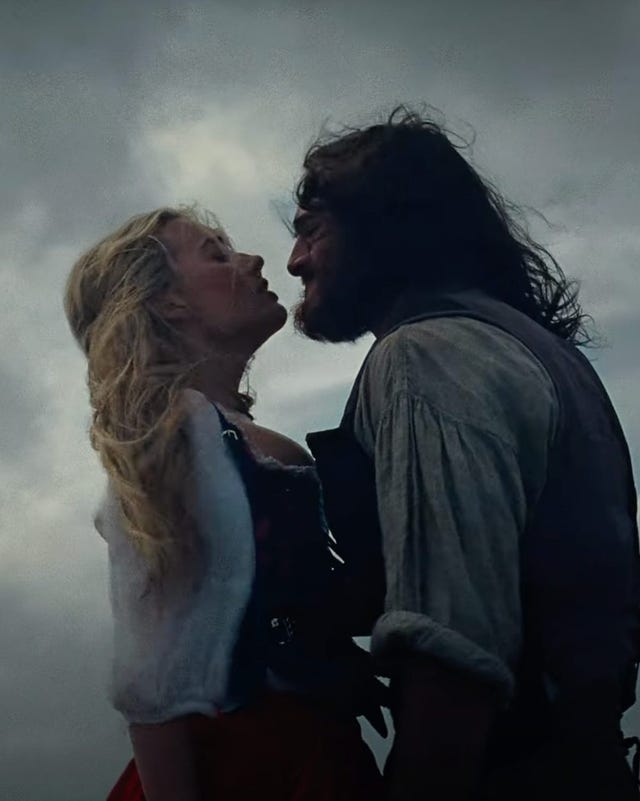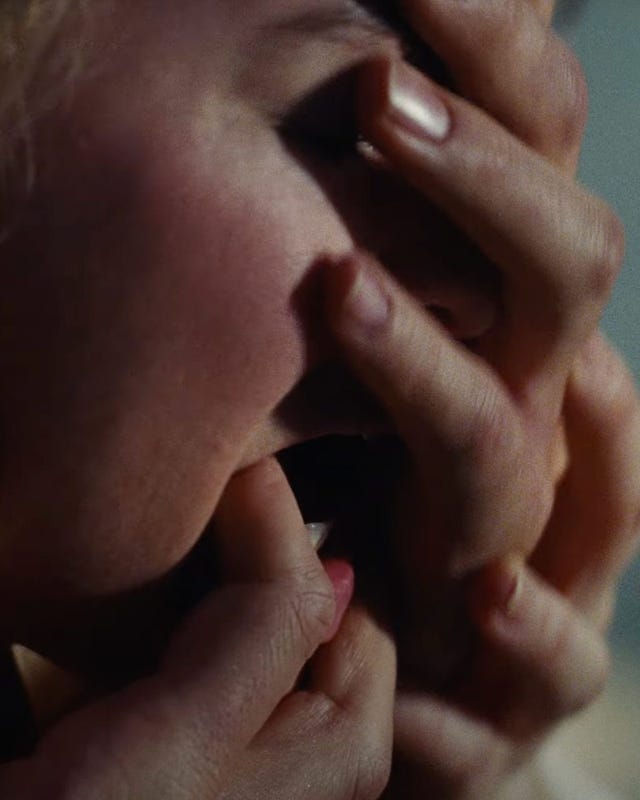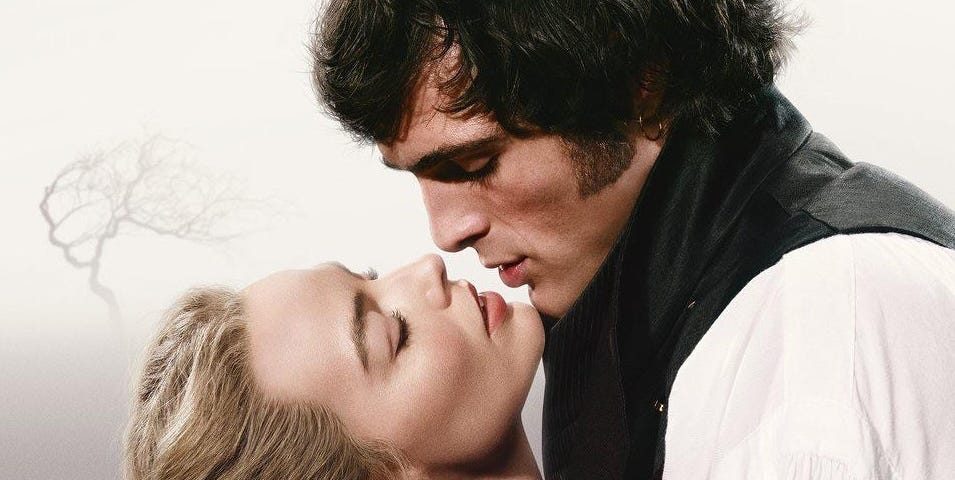When news broke last year that Emerald Fennell was at the helm of a new film adaptation of Wuthering Heights, Emily Brontë fans everywhere immediately saw visions of a Saltburn-coded take on the Gothic romance rife with unflinching displays of sexual depravity. Jacob Elordi and Margot Robbie will star in the classic 19th-century novel tells the twisted, multigenerational tale of Cathy and Heathcliff, childhood playmates turned soulmates and the havoc their thwarted love continues to wreak on those around them even after Cathy’s death.
After the trailer dropped on Wednesday and confirmed our suspicions (think whips, corsets, and fingers in mouths), it’s clear that to some, the prospect of a disturbingly horny onscreen adaptation of Wuthering Heights is not only on brand but a dream come true—an opportunity to give life to the darkly erotic undertones Brontë was arguably forced to veil and repress due to the Victorian mores of her time. “They going full on bodice ripper with this one. Feels like an erotic period drama…not mad at that idea,” wrote one redditor. But for many, this felt like the ultimate betrayal—sullying a timeless classic that clearly didn’t need overt sex scenes to captivate audiences for nearly two centuries. “WTH???!!!” said another commentor online. “This is 50 Shades of Bridgerton style distortion of a Bronte novel.”
 Warner Bros.
Warner Bros.
Margot Robbie and Jacob Elordi as Cathy and Heathcliff in Wuthering Heights
Recent dispatches from preliminary test screenings of Fennell’s Wuthering Heights also suggest the audience response was “mixed” due to the film’s “polarizing” and “hyper-sexualized” imagery. World of Reel, a hub for alt movie news, called the adaptation “a deliberately unromantic take on Brontë’s novel, stripped of emotional nuance and full of salacious detours that serve shock value.” Whether the idea of those shocking and salacious detours has you totally turned off or all the more eagerly anticipating the film’s 2026 release, I think it’s safe to say we’re all in for another rousing round of sex scene discourse when Wuthering Heights premieres early next year.
Maybe the erotic undercurrent of the novel can only maintain its sexual charge as long as it remains unearthed and unfulfilled.
Much of said discourse has centered around the question of whether sex onscreen is narratively “necessary” in any given movie or TV show. If a sex scene fails to meaningfully advance the plot in the eyes of a certain kind of vocal and very online critic, it’s typically panned as “gratuitous”—unnecessary fluff at best, if not actively “problematic” in its sexual explicitness.
For those who think sex scenes must justify their existence and excuse their obscenity by proving themselves load-bearing plot points, a sexed-up adaptation of an iconically sexless 19th-century novel is the most defenseless of offenders. How could a sex scene possibly be necessary if it wasn’t even part of the original narrative? These chaste literary precursors to the romance genre are easily weaponized by the anti-sex-scene set against the sex-forward nature of modern romantic media in general.
These days, sex and romance are practically synonyms. If you identify as a lover of “romance” novels, everyone knows you like your literature on the spicy side. But Jane Austen didn’t need all that sex to tell some of the greatest love stories of all time, did she? These enduring classics and their apparent lack of sex lend themselves all too easily to the suggestion that maybe romance was better—more romantic, even—before we made it all about sex.
For those of us with higher sex scene tolerance levels, it’s easy to roll our eyes and chalk this preciousness up to conservative sex negativity and trad-wifey nostalgia for an era of less liberated sexual mores. But I’m here to suggest there’s something more interesting at play. Maybe the resistance to spicing up 19th-century classics isn’t a sign of Gen Z sex-phobia. What if we are not a generation of prudes but a generation of discerning consumers? Maybe it’s just that we prefer our sex scenes with a healthy dose of yearning, as we love to say online.
To yearn may just be better than actual sex.
And if ever there were a classic tale of yearning, it’s Wuthering Heights—a story of lovers so star-crossed, the romantic tension preserved by their thwarted love defies even death and they literally pine for eternity. And the thing about yearning is it tends to precede sex rather than accompany it. To yearn is to desire—and it may just be better than the actual sex itself.
 Warner Bros.
Warner Bros.
An image from Emerald Fennell’s adaptation of Wuthering Heights
Therein, I suspect, lies the real crux of the angst some viewers may feel regarding the prospect of an overtly sexual Wuthering Heights. Less anti-sex squeamishness and more subconscious desire to suspend the eroticism of wanting sex that actually having it can’t help but quell.
Culturally, sex is often positioned as a consummation, an ending. This is evident even in the language we use to describe the act: to orgasm is to “finish,” or, in the infamous French euphemism, to die “the little death.” Historically, to “consummate” a marriage was to make it official by doing the deed—to sign, seal, and deliver that marriage contract with a bang. Jane Austen may not have needed sex to tell a great love story, but the “marriage plot” her work pioneered—a literary device that continues to inform everything from romance novels to rom-coms—always ended with a wedding…and with it the unspoken implication of sex. Our romantic leads are finally wed, and now we can assume they’re off to the real…finish.
This tension—the “will they, won’t they” that makes up most marriage plots—is the part of the story that gets our blood pumping. There is an eroticism to this anticipation, one that mirrors the literal horniness that precedes actual sex. So much of sexuality is not the act itself but the desire for it, the wanting more than the having. Because once you have it, it’s over—not unlike a book you raced breathlessly to the end of only to wind up disappointed now that there’s no more of it.
Perhaps, on some level, a discomfort with sex scenes is less reflective of a puritanical aversion to sex than a desire to suspend the horny anticipation of it, to stave off the disillusionment that comes with realizing that getting the thing you want means you no longer get to want it. That maybe yearning for it was the best part after all. This is arguably the central tragedy of human existence: You can’t want what you have. More than we yearn to be sated, we yearn to yearn.
Perhaps discomfort with sex scenes is a desire to suspend the anticipation.
And if there’s one novel that embraces this central tragedy, it’s Wuthering Heights. To some anxious Brontë fans, then, the idea of potentially watching Margot Robbie and Jacob Elordi fuck onscreen as Cathy and Heathcliff next year may feel like a betrayal of the ever-unresolved sexual tension that is the lifeblood of Wuthering Heights. Maybe the erotic undercurrent of the novel that some hope—and others will hate—to see brought to life on the big screen can only maintain its sexual charge as long as it remains unearthed and unfulfilled.
There’s only one way to find out. Personally, I’m not mad at a sexy Wuthering Heights. Lest we forget, Twilight was something of a horny take on Wuthering Heights that eventually inspired even hornier fan fiction in the form of Fifty Shades of Grey—so I think we can all rest assured that whatever erotic subtext Emily Brontë may or may not have woven between the lines has already been cashed in on in much less integrity-of-the-text-honoring ways than whatever Emerald Fennell is likely up to.
But if you still find yourself involuntarily clutching your pearls at the idea of sex scenes adulterating an adapted work of classic literature, maybe you don’t actually hate sex; maybe you just love to yearn.

